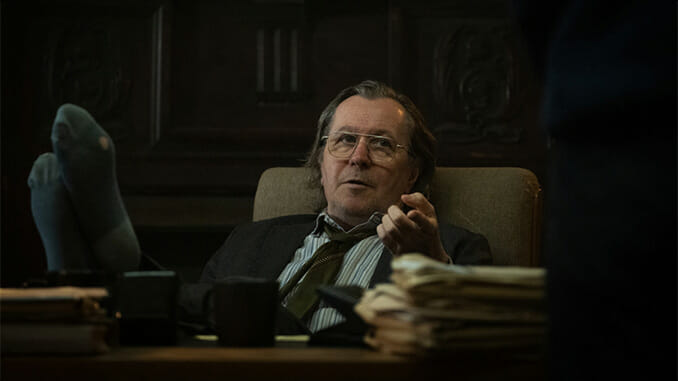Apple TV+’s Slow Horses Is an Instant Classic in the Modern Spy Genre
Photo Courtesy of Apple TV+
Slow Horses’s Jackson Lamb is an out-of-shape, slovenly, insulting cynic who runs the small fiefdom known as “Slough House,” an outpost of British foreign intelligence where the worst spies in MI5—the ones who have screwed up to an almost unforgivable degree—are put out to pasture in the hopes that they’ll never be heard from again (worst case) or simply quit in shame (best case). Slough House is itself a term of derision (it’s not actually in Slough, but so far from the main action that it might as well be), and the term “Slow Horses’’ is a perfect punny fit for the has-beens and screw-ups who populate its halls. Lamb is their cruel king, and as such, you might suspect, the worst offender. But there is a passage in Mick Herron’s bestselling book, which presaged the 6-episode Apple TV+ show, in which Diana Taverner—who is one or two heartbeats away from the very top of MI5—warns a man named Jed Moody who is set to cross Lamb:
“Oh, and Moody? Word of warning. Lamb’s a burn-out for a reason.”
“Meaning?”
“Meaning when he was in the field he had more to worry about than his expenses. Things like being caught, tortured and shot. He survived. You might want to bear that in mind.”
Jackson Lamb, in short, is a complicated character, and you don’t have to go very deep into Herron’s book to realize he’s a tremendous one. Before cracking Slow Horses, I read comparisons between Herron and John LeCarre. While those comparisons annoyed me as a card-carrying LeCarre worshiper, after reading his prose I’m willing to concede at least that Herron belongs in a very small group of writers—LeCarre and Alan Furst among them—who write electric spy fiction. Jackson Lamb is his stand-out, and the ultimate brilliant choice made by Apple TV+ was to fill that role with a man who once played LeCarre’s stand-out, George Smiley: Gary Oldman.
To say it’s a pleasure to watch Oldman in this role is inadequate; if you’re a fan of spy fiction, you have to use words that make you feel almost corny, like, “it’s a gift.” Depending on the scene, he’s hilarious, odious, intimidating, and thrilling, and unlike the genius of his understated Smiley in Tinker Tailor Soldier Spy. Here he has free emotional range to embody the almost repellent cynicism of Lamb. Much of it is deeply, darkly funny, and his treatment of his team is verbally abusive in ways reminiscent of the best Iannucci characters. In an early scene, one of his charges kills a man, and protests to Lamb that he didn’t mean to do it.
“Of course you didn’t!” Lamb spits back. “If you meant to kill him, he’d still be alive.”
-

-

-

-

- Curated Home Page Articles By Test Admin October 21, 2025 | 3:10pm
-

- Curated Home Page Articles By Test Admin October 21, 2025 | 2:57pm
- Urls By Test Admin October 21, 2025 | 2:57pm
- Curated Home Page Articles By Test Admin October 21, 2025 | 2:55pm
-

-

-

-

-

-

-

-

-

-

-

-

-

-

-

-

-

-

-

-

-

-

-

-

-

-

-

-

-

-

-




































